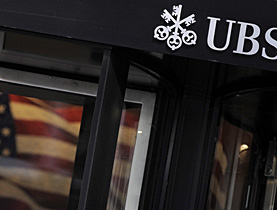UBS deal seen as “best of all bad solutions”

Swiss newspaper editorials expressed a degree of scepticism on Thursday over a deal to end a tax dispute between the United States and big bank UBS.
The settlement means UBS will give the Internal Revenue Service account details on 4,450 wealthy American clients suspected of breaking tax laws. Commentators praised the deal’s negotiators but worried about mounting pressure on the country’s banking secrecy laws.
“For decades Switzerland has been traditionally very hesitant in terms of helping foreign governments, especially when it involved protecting the private sphere,” a commentary in the Neue Zürcher Zeitung (NZZ) read. “With this the tradition comes to a definitive end. The fallout will keep our rule of law and the financial market busy for a long time.”
Newspapers from the French- and German-language regions generally agreed that the UBS case could have ended much worse, with a drawn out legal battle in a US District Court that would have hamstrung one of the world’s biggest wealth management corporations.
While the Basler Zeitung praised the Swiss government for displaying “enormous negotiating skills”, many editorial boards picked over what the decision means for the future of banking.
Praise and criticism
The Zurich-based Tages-Anzeiger newspaper had feared the worst and was pleasantly surprised by the terms of the settlement, which were first revealed on Wednesday.
“UBS compromise: the government can be praised for once,” the headline read. “Political stability and the rule of law have been strengthened. That is more important than banking secrecy — for the financial market, too.”
The commentary pointed out that UBS in this case was not a victim “but a perpetrator” having sent agents to the US with encrypted laptops and counter-surveillance training as they convinced some wealthy Americans to hide assets at the bank.
The commentary blamed the bank for embroiling the government in its surreptitious scheme.
“The criminal behaviour of UBS has not only cost SFr40 million in public money but it nearly led to an economic worst-case scenario,” the paper continued.
That said, there is some good, too.
“The biggest advantage for Swiss banks aren’t legal niches for dubious clients but Switzerland’s political stability and the reliability of the rule of law,” it concluded. “The compromise has strengthened both.”
And then what?
The newspapers 24 Heures and Tribune de Genève also called the deal a quasi-win for Switzerland, while the French-language Le Temps declared an outright “American victory”.
“The agreement is in some ways going to define the size of the net that the IRS can take on its fishing trip for fraudsters,” Le Temps wrote. “Because the big bank represents a systemic risk for Switzerland, the United States was able to take advantage of its troubles to impose its own fish quota.”
“Moreover, the Swiss government is doing the same for other Swiss banks that could be in a similar situation… The Americans then have a good reason to claim victory. In creating a precedent with the UBS case, the ex-number one wealth management firm, they are announcing an attack on all fraudsters.”
The NZZ was also sceptical, saying the deal looks good only at first sight.
“The best of all the bad solutions—with a catch,” read the Zurich paper’s headline. The newspaper commentator praised negotiators for keeping Swiss laws intact and preserving a client’s right to appeal.
But it reminded readers that Swiss laws were already severely weakened several months ago when the country was forced to renegotiate double-taxation agreements with more than a dozen states.
Worse, said the paper, is what happens when US clients file complaints against handing their data over to the IRS. The legal outcome is far from certain.
“If the courts conclude that a dragnet isn’t permissible or the distinction between tax evasion and tax fraud is narrowed, then it would be possible that not a single file would be delivered. And then what?”
Tim Neville, swissinfo.ch
Britain’s Financial Times on Thursday declared “US wins UBS accounts deal”, adding “Hole blown in famed Swiss bank secrecy”.
“If yesterday’s deal between the US government and UBS were a corporate balance sheet, the ledger would look very lopsided,” the paper wrote.
As the Swiss fear, the FT agreed that the deal could open the door to “fishing expeditions” and attacks on other Swiss banks.
The European edition of the Wall Street Journal added fuel to that argument by reporting that some wealthy Americans have identified almost ten Swiss and European banks — including Credit Suisse, Julius Bär and Zurich Cantonal Bank – as institutions that held their accounts. No wrongdoing was implied.
“Lawyers following the UBS settlement now are watching to see whether the settlement establishes a blueprint for how the IRS can obtain information in the future from Swiss banks,” it wrote.
The New York Times says the agreement is likely to “unnerve” American UBS customers who could be worried that their names will be divulged. Others could be deterred from opening Swiss accounts in the future, it said.
“We will be receiving an unprecedented amount of information,” IRS Commissioner Doug Shulman noted on Wednesday.
“We short-circuited a protracted summons and litigation process by culling the accounts to the 4,450 that were of the greatest interest to us,” he said.
In other comments he said: “These accounts held over $15 billion at one point in time. You can expect us to continue to be aggressive with institutions that are helping Americans avoid taxes.”
As for Swiss banking secrecy: “It’s a real sense that the world of bank secrecy is eroding.”

In compliance with the JTI standards
More: SWI swissinfo.ch certified by the Journalism Trust Initiative













You can find an overview of ongoing debates with our journalists here . Please join us!
If you want to start a conversation about a topic raised in this article or want to report factual errors, email us at english@swissinfo.ch.